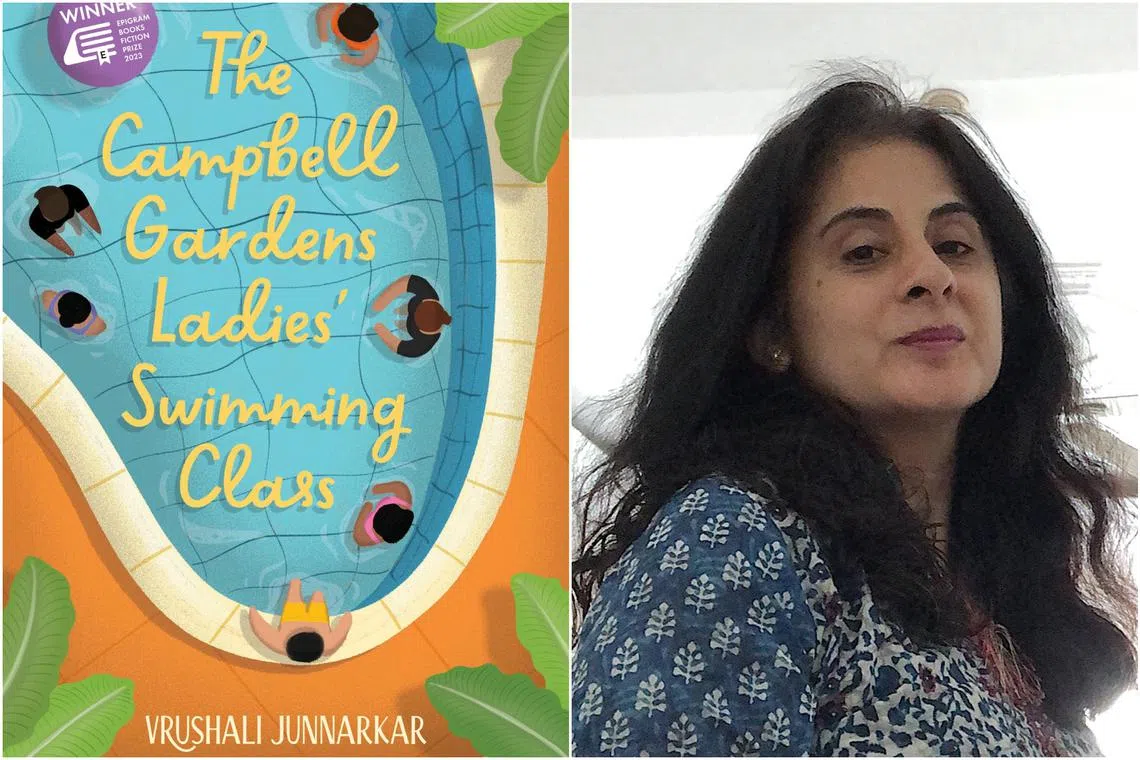Book review: The Campbell Gardens Ladies’ Swimming Class dives into the world of middle-aged Indian housewives
Sign up now: Get ST's newsletters delivered to your inbox

Vrushali Junnarkar's debut novel, The Campbell Gardens Ladies’ Swimming Class, won the 2023 Epigram Books Fiction Prize.
PHOTOS: EPIGRAM BOOKS
Follow topic:
The Campbell Gardens Ladies’ Swimming Class
By Vrushali Junnarkar amzn.to/477UtOd
Fiction/Epigram Books/Paperback/246 pages/$29.05/Amazon SG (
3 stars
A group of Indian women learning to swim in a Singapore condominium is the subject of this novel, which is Singapore-based Indian author Vrushali Junnarkar’s debut, and which won the Epigram Books Fiction Prize in 2023.
It begins with a surreal dream sequence that forms an interesting entry point into the granularity of the lives of these middle-aged housewives: Protagonist Suchi is gliding along in an Olympic-size pool when the water suddenly starts draining. Then jellyfish and slimy stingray appear as she miraculously stays afloat.
This brief venture into an alternate aquatic universe is interrupted when her eight-year-old son jolts her awake from her siesta. Dad is watching television, so Suchi gets up. It is the first hint of the naturalised gender order that is one of the main axes along which this novel operates.
Junnarkar’s choice of subject matter is a brave one, both for its focus on Indian women and on swimming. In an island nation like Singapore – “In the oppressive tropical heat, artificial water features were a much-needed quencher” – swimming is an activity that most people partake in without second thought.
But for Suchi, there are hurdles galore, both individual and cultural. Chief of these is her husband’s – and her own – discomfort with showing too much skin in public.
The list of obstacles goes on: Suchi’s many cooking chores; money; a male instructor; the fear of a tan which had decreased some of her cousins’ “marriage-market potential by a factor of three”; finding a suitable swimsuit for her XXL size.
By following Suchi’s manoeuvres just to be able to learn to swim, Junnarkar is, in fact, writing about an experience of brown travails and joy that remains very much outside of the Singapore and, global, mainstream.
The problem is that the most exciting thing to happen might be someone slipping and falling. There are moments when one feels Junnarkar has nowhere to go, trapped within the confines of the condominium pool.
It is a particular problem with slice-of-life novels dealing with routine that challenges even the most seasoned writers, the tension flatlining once the novelty wears off.
For this reviewer, it is the first 70 pages taking place largely on dry land that most excites, when a more complex narrative web could be glimpsed before too many elements were jettisoned.
There is honesty, for instance, in Suchi’s friend Latha’s jealousy of her Filipino maid’s youth and freedom on Sundays, as she watches her venture out to meet her friends.
She is wary of the effect her helper’s leopard-print skirt hanging on the bamboo pole might have on her husband – a concern shared among the women. This, however, remains a self-contained psychological exploration and Junnarkar stops short of further parsing that dynamic.
Similarly, newcomer Nayanika’s monogrammed T-shirt and Birkenstock-clad feet provoke gossip, but fault lines between her and the other Indian women are washed away too easily by the homogenising pool.
In one of the best-written sections, the Indian women of the condominium, lovingly dubbed the “Indian Mahila Mandal”, pronounce disapprovingly that Nayanika likely makes only pasta and pizza, after hearing that she is willing to buy ready-made food.
A subsequent friendly debate between North and South Indians at this loquacious gathering is filled with a lot of charm and cultural freshness. Suchi’s home state of Maharashtra is comically disavowed by both sides.
Otherwise, the very ordinary swimming lessons need a lot more symbolic weight for ballast.
Or perhaps the feat of these women plucking up the courage to swim is enough – a small miracle happening across the country every day that deserves celebration. Just do not expect readers to hold their breaths for too long.
If you like this, read: What I Talk About When I Talk About Running by Haruki Murakami (Vintage, 2009, $15.66, Amazon, go to amzn.to/3G1aERK
Jumpstart your gift shopping for the 2023 Christmas season.
If you like the books The Straits Times has reviewed in these pages, we have a promotion code with Amazon.sg that will snag you additional discounts for your book buys. From Nov 20 to 23, get $5 off with $50 minimum spending. From Nov 24 to 27, get $10 off with $80 minimum spend.
Go to amzn.to/3QVSLd4
This article contains affiliate links. If you buy through these links, we may earn a small commission.


